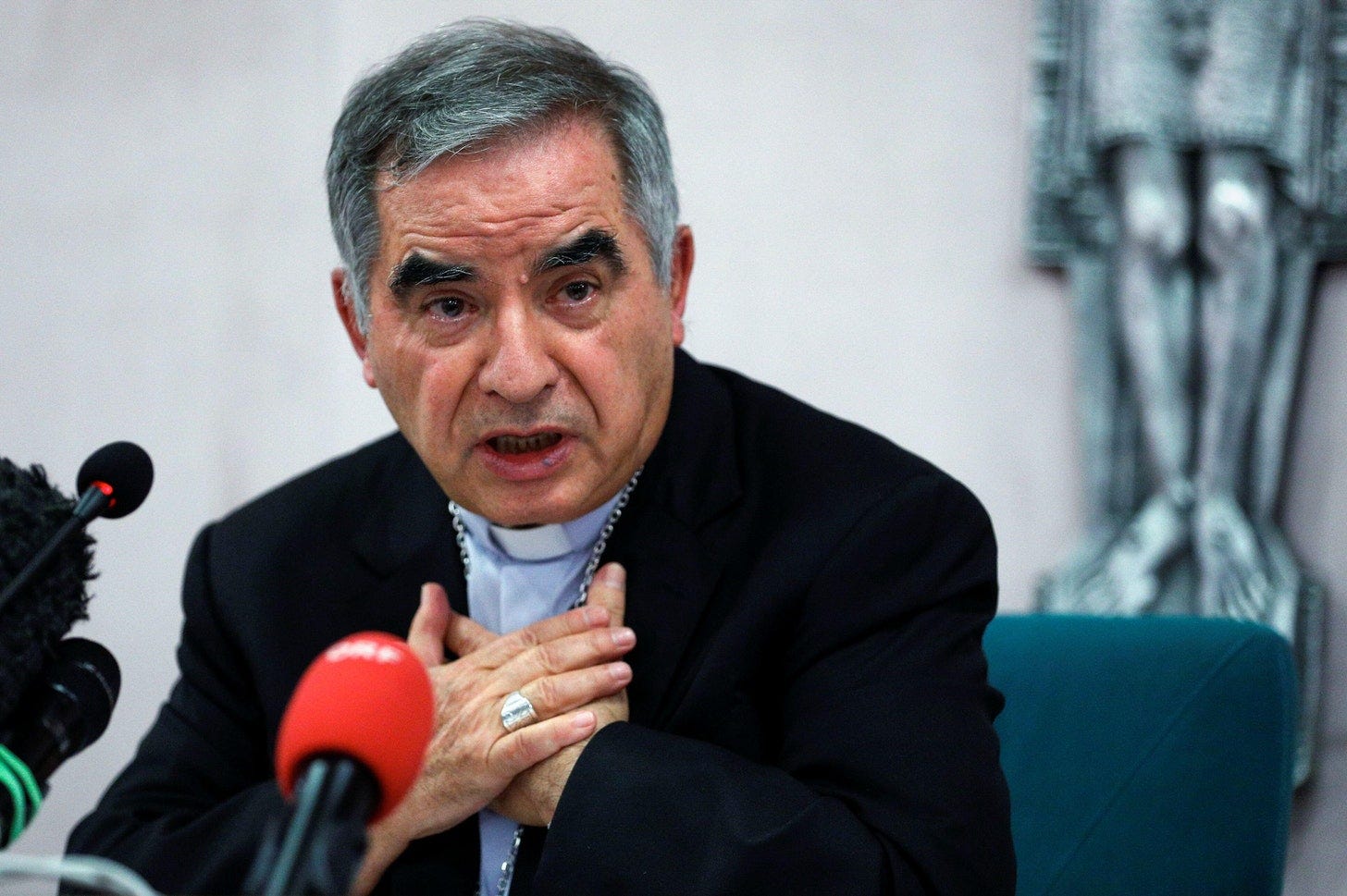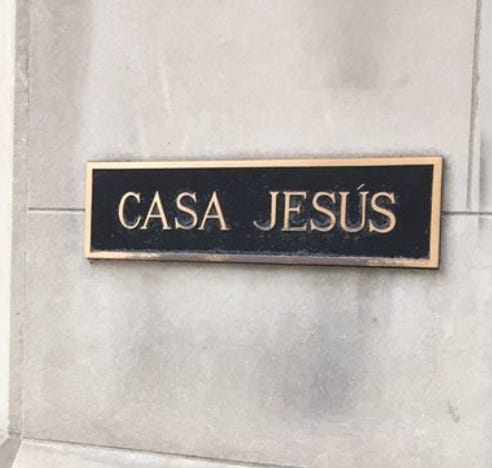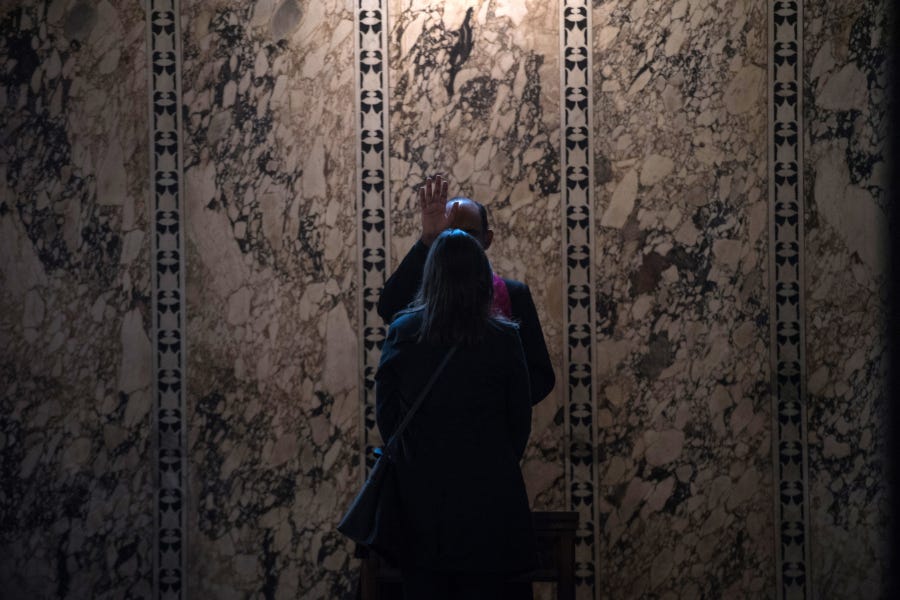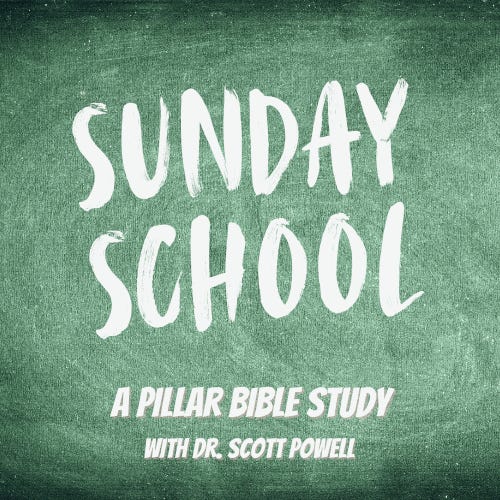
Pope Francis authorized up to one million euros in secret expenses to free a kidnapped religious sister, Cardinal Angelo Becciu told a Vatican City court on Thursday.
Becciu gave evidence on May 5 for the second time in the trial of the Vatican financial scandal, his first return to court since the pope dispensed him from the pontifical secret.
Answering questions from judges about his employment of Cecilia Morogna, the self-styled geopolitical security consultant and private spy, Becciu said that payments to Marogna were part of a project to free Sr. Gloria Cecilia Narvaez Argoti, a Columbian religious sister kidnapped by jihadists in Mali in 2017 and held for nearly five years.
The cardinal, who served as sostituto at the Secretariat of State from 2012-2018, said that Pope Francis had approved “every step of this operation” and insisted on total secrecy.
The operation, according to Becciu, had a budget of up to a million euros to be paid through Marogna to an UK-based consultancy firm The Inkerman Group, which provides “protection,” “risk analysis,” and “intelligence services” to private clients.
According to testimony from Msgr. Alberto Perlasca, a former official at the Secretariat of State, Becciu continued to authorize payments from the secretariat to Marogna even after he left the department in June, 2018.
In a 2020 interview with the Italian newspaper Domani, Marogna said that her work for the secretariat had involved the use of London-based brokers, adding that the sums of money she was paid - 500,000-600,000 euros - was “small change.”
“I can also tell you that Becciu and I weren’t the only ones running certain businesses,” she said at the time.
Narvaez was released in October 2021.
While text messages obtained by Vatican prosecutors show Becciu authorizing money transfers “in great secrecy” to Marogna, ostensibly to help secure the sister’s release, the Italian foreign ministry and intelligence services have taken credit for Narváez’ freedom and have previously rejected claims that Marogna was a joint agent for the Vatican and Italian governments.
Becciu is on trial in Vatican City for abuse of office, embezzlement, and witness tampering. Marogna, also on trial, is accused of embezzling more than half a million euros paid to her by the Secretariat of State, apparently authorized by Becciu.
Vatican prosecutors say that the money paid to Marogna was spent on designer label goods and luxury hotel stays. Marogna has said that they were working expenses incurred while “network building” on behalf of the Vatican. Becciu told the judges on Thursday that “no amount” of the money paid to her had been designated as “compensation” for Marogna.
Marogna has also previously claimed she worked as a kind of personal spy for Becciu, gathering dossiers of information on the private moral failings of other senior Church officials. She has yet to appear in court.
Perlasca
During his court appearance Thursday, Cardinal Becciu also spoke about his working relationship with Msgr. Alberto Perlasca, the former head of the Secretariat of State’s administrative office who is now the prosecution’s star witness in the sprawling case against 10 defendants connected to the secretariat.
Becciu described Perlasca as an "irritable" and argumentative subordinate who treated financial affairs as his own “small kingdom.”
Perlasca has told Vatican investigators that Becciu ordered him to prepare large sums of cash for him and to transfer money to Marogna’s bank account, but that the cardinal would not discuss the purpose of the payments.
“He asked me ‘Why didn’t you eliminate the transfers [from secretariat records]?’ I said ‘Why should I have eliminated them if they were ordered by His Holiness?’”
On a separate occasion, Perlasca recounted asking Becciu what the money was for and being told “that the 500,000 we gave was more of a ‘contribution,’ because [Marogna’s] request was much higher, it was millions ... it was millions, it was three or four million, something like that.”
“I said [to Becciu] ‘Look, but how long and for what did we give her this money?’ ‘Eeeeeeh! We can talk about that in four or five years,’ he told me.”
Becciu told the court on Thursday that Perlasca had become suicidal following his removal from curial service — he was transfered to the Apostolic Signatura in early 2019 before being suspended following raids by Vatican authorities on his office and home.
The London deal
Becciu told the judges on Thursday that all his investment decisions while at the secretariat were guided by Perlsaca, who had steered him away from an investment in Angola through the company Falcon Oil and towards doing business with Raffaele Mincione, the investment manager from whom the Vatican eventually bought the London building at 60 Sloane Ave., posting a loss of more than 100 million euros on the resale.
The final stages of that purchase triggered the two-year investigation leading to the current trial.
Becciu told the court that neither the pope nor Cardinal Pietro Parolin had expressed any concern over the investments with Mincione at the time. Mincione is also charged in the trial with fraud, embezzlement, and money laundering.
Various media outlets have reported that the money for the investments with Mincione, initially 200 million euros, included funds taken from Peter’s Pence, which Becciu again denied on Thursday.
However, previous reporting by The Pillar has established that the money invested by the Vatican actually came from loans given by two Swiss banks — Credit Suisse and BSI. The Secretariat of State secured the loans against other Vatican funds and assets held on deposit with the same banks, including charitable funds like Peter’s Pence.
The borrowed money was invested in the Athena Global Opportunities Fund, which was created by Mincione to manage the Vatican’s investment with him. Mincione used Vatican funds to invest in his other businesses and projects, including the London property. He gave his businesses no-penalty loans, while at the same time charging the Vatican millions of euros in performance and management fees.
Mincione also had a complicated financial relationship with Gianluigi Torzi, the broker hired by the Secretariat of State to negotiate its separation from Mincione and acquire the London building. Torzi is accused of fraud and extortion over his role in the deal.
The Pillar has previously reported that Mincione invested Vatican money in debt products marketed by Torzi, some with links to mafia-affiliated companies. Mincione invested Vatican money into one such debt product called Sierra One bond,
Torzi, in turn, used his own companies to lend Mincione tens of millions of euros during the same period.
Cardinal Pell
During his May 5 appearance, Becciu also confirmed reports that some 2 million dollars in payments he authorized to the office of a tech security firm in Australia were for the registration of the top level domain “.catholic” by the Pontifical Council for Social Communication.
The payments were sent over 2016-2017, and coincided with the investigation and trial of Cardinal George Pell on sex abuse charges in Australia, fueling speculation in Italian media that Becciu had sent the money to interfere with Pell’s trial.
In October 2020, the newspaper Corriere della Sera printed an article suggesting that the payments to the company, Neustar, “may have been used to 'buy' the accusers in the pedophile trial against Cardinal George Pell.” Pell’s eventually overturned conviction was based on the testimony of a single accuser.
While Becciu repeatedly and emphatically denied any link between the payments and Cardinal Pell, he refused to disclose what the money was for, insisting that it was a matter of state secrecy.
In several interviews, Cardinal Pell expressed his own desire to see the matter addressed, and publicly asked Becciu to end the media speculation about the payments, which Becciu refused to do, calling Pell’s questions ““offensive to [his] personal dignity” and insisting that the subject was “high, demanding, and certainly confidential.”
Despite having previously insisted that the purchase of the .catholic domain name was too sensitive to disclose to Pell, Becciu told the court on Thursday that Pell had himself approved the expenditure in a letter dated September 11, 2015.
Becciu told the court that he “regretted” that the incident had led Pell to “stumble into a misunderstanding.”



